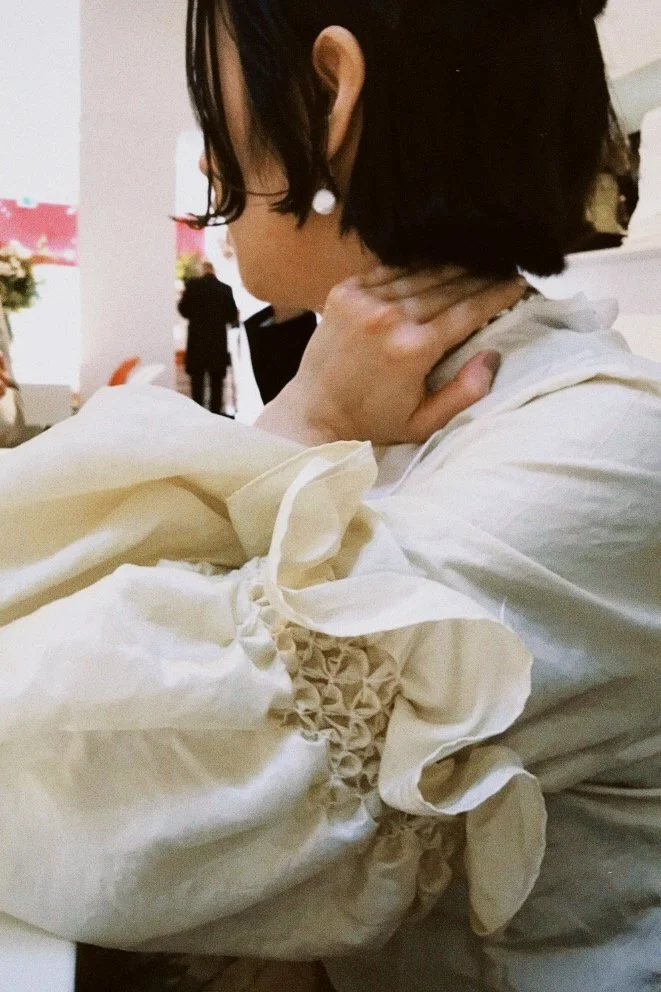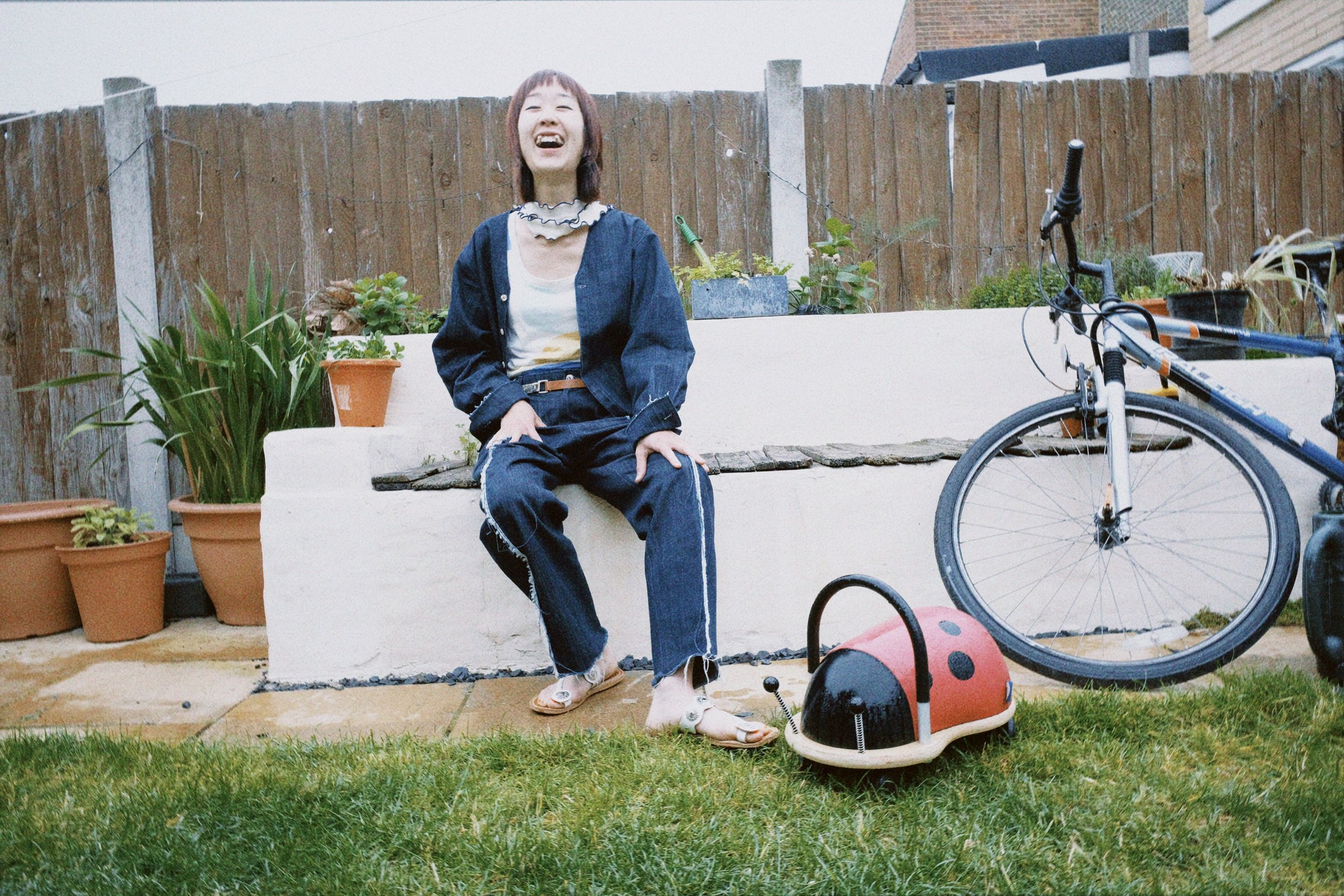Akiko Matsuda -Ceramicist ・Clay educator
Akiko at her house in East London.
あきことは、2019年ロンドンにある陶芸ギャラリーを通して知り合った。
それから、イギリスでのコロナ禍での結婚、出産、育児と仕事の両立。たくさんの波がありながら、それを前向きにうまく乗りこなす、あきこ。
あきこと一緒にいると、ポジプティブなパワーで周りの人も皆満たされていくように感じる。このインタビューを通して、その根源を、前向きにいられることのヒントを見つけられたらなと、思っているよ。
Q: まず、どんな活動をしているか教えてくれる?
イーストロンドンを拠点に陶芸スタジオでコースや体験クラスの指導をしてる!コロナの影響も少なからずあると思うけれど、スクリーンライフからエスケープして、もっと自分の手の感覚を研ぎ澄ませたいと思ってる都会人がたくさんスタジオに来てくれる。中には心の傷と戦ってる人も。制作プロセスを通してそれぞれの人たちが前向きになれるお手伝いができたらと思って日々お仕事しています!
Q : 異国でのコロナ禍での結婚、出産、育児。仕事との両立。全てがチャレンジに思うけど、記憶に残る大変だったエピソード、それをどうやって乗り越えたのか聞かせて。
2020年は想定してなかった出来事の連続で様々な変化を受け止めていかなくちゃいけなかった。今なら起きた全てのことに心から感謝できるけど、それが本当の意味でできるようになるのも心の底の余裕や安心感がないとできないこともわかった。
ロストしそうになったときは私はロクロや手仕事に限る!陶芸は完成するまでのプロセスと繊細さと手のかかる素材だけれど現実的な時間と感覚に寄り添ってくれるから今まで何度も救われている!
-起こる出来事にしっかりと向き合わないとでてこない、とても深いことばだね。
それに、ものづくりを生業としている身としてとても共感できる。私たちにとっては、作ることは挑戦でもあるけど、同時に安心感とメディテイションみたいなところもあるよね。
Q:ところで、あきこは日本で生まれ育ったわけだけど、 英国で子育てをする中で、日本との違い、発見はあるのかな?
とにかく子供達を褒めて伸ばす!それぞれ違って良いんだよと言わないと成り立たないカオスな多様性があるからなのかな。(私達のご近所さんもとなりはソマリアの大家族、上階にはポーランドのカップルとご近所さんも色とりどりのバックグラウンドです。) 今現在日本で子育てしたことがないので比べることはできないのだけど、ロンドンの公園で他の親子さんを見ていると、子供を一人前として触れ合ったり説明したりコミニュケーションとっている光景をよく目にします。まだ幼くても質問したりささいな回答を掘り下げてキャッチボールを続けたり。
システムの違いとしては幼稚園の保育時間が短かく、保育の費用がとても高いので仕事と育児のバランスを取るのが難しい。また小学校もきちんと親が送り迎えをします。休暇も多く、子ども達を親達は長い時間構ってあげないといけないので学校が始まってもかなり参加型。日本の様な受け身、学校丸投げの姿勢では成り立たないのが現実です。
Q: 幅広いバックグラウンドの人たちに囲まれて生活している中で、あきこ自身、自分の背景からくるアイデンティティを強く感じるときはある?
コミュニケーションの取り方にアイデンティティを感じます。仲良くなったとしてもボケツッコミのカルチャーがないので、場を和ませるためのボケがまったく通じない。(掛け合いのような役割分担もなく、話し手として会話をするときは話の意図とオチをもっておく必要があるような気がしてしまいます。)
また謙遜のような姿勢が全くなく、自慢話も不幸話も良くもネタとして大いにくりひろげるのには来た当初驚いた!
Q: 以前にもロンドンで活躍する陶芸作家のMiyu Kuriharaにインタビューをしたのだけど、あきこの活動の仕方は、作家だけにとどまらず、様々なところでワークショップを開催したり、陶芸を通して人との繋がりを強く感じる。そこでの発見があれば教えて欲しい。
土に触れるというアクティビティ自体ほとんどの人にとってちょっと特別なことだ思う。特にはじめてのロクロに挑む瞬間は人それぞれ挑み方が違うし、どんと構えていたり、おどおどしてしまったり、その人が持ってる性格と未知なことに遭遇した時立ち向かうパワーを見られる気がする。そしてしばらくするとみんなそれぞれの手の感覚に集中していって、バラバラな個々が一つの時間と場所をつくりあげてくような一体感も出て来るから面白い!クラスを英語でしきり、感覚的なことも含めバランス感を教えるのは難しいなと思ったこともあるけど、結局のところ言葉でもなく、どう見えるかでもなく、どう感じるかが大切なんだというところに答えをゆだねようと思ってる!
Q: あきこが2020年パートーナーと籍を入れた時にも、ドレスを作らせていただいて、その時もとても素敵にドレスを着てくれて、とても嬉しかった。服を着た時に感じたことがあれば教えて欲しいな。
ロックダウン寸前の結婚式に衣装制作の依頼を引き受けて作ってくれたことは本当に心に残ってる!人生で一大イベントにコロナの影響で双方両親はじめ友人たちの参列ができなくたってしまって、なんだかすごく心細さと故郷との距離を感じたりもしたのだけど、手作りで仕上げてくれた衣装に袖を通した時、今このロンドンの地でストーリーは続き、周りの方々に見守られてるんだというぬくもりを肌で感じることができ、その日からの新たな人生のはじまりのパワーになったよ!
Q:最後にこれからはどんなことに挑戦していきたい?
自分の作るものを届けていきたい。
母国を離れてゼロコネクションからさまざまなつながりでここでお仕事させてもらい日本では絶対に味わえなかった生活、経験をさせてもらいました。今は少しがむしゃらになっていた肩の力を抜いて、学んできたことを形に落とし込んでいきたいと思っています。
-答えは分からない現実と未来を、柔らかい姿勢で、真正面からまっすぐと受け止めるあきこに、また勇気とエネルギーをもらい、私は服づくりに戻ります。
ペッカムのパブでお互いの仕事終わりに、パイントビールを片手に色々な話をした日々を思い出しながら。
I met Akiko at a ceramics gallery in London in 2019.
Since then, she has been married, had a baby, and juggled parenting and work during the COVID-19 pandemic in the UK. Despite the many waves, Akiko manages to ride them all out in a positive way.
When I am with her, I feel that everyone around her is filled with her positive energy. Through this interview, I hope to find the source and the secret of her positivity.
Q: First, can you tell me about your projects in London?
I'm based in East London, teaching courses and hands-on classes at a pottery studio! I think the pandemic has had a bit of an influence, but I get a lot of urbanites who come to my studio to escape from their screen time and sharpen their sense of touch. Some of them are battling emotional scars. I work every day in the hope that I can help each of these people become more positive through the production process!
Q: Marriage, childbirth, and parenting during the pandemic in a foreign country must have been a challenge. Please tell us about a memorable and difficult story and how you overcame it.
In 2020, I had to accept a lot of changes due to many continuity unexpected events. I can now be truly grateful for everything that has happened, but I also know that I can't really do that without a sense of comfort and security deep down inside.
When I feel like I'm on the verge of getting lost, I'm all about the potter's wheel and hand work! Pottery has saved me so many times before. It is a long, delicate and tricky process but it brings me closer to real-time and feeling!
-It is a very profound word that only comes out when you face challenging events as you did. I can really relate to that feeling as a person who makes things for a living just like you. For us, creating is a challenge, but at the same time, there is a sense of safety and meditation.
Q: By the way, you were born and raised in Japan and now raise your children in the UK. Have you found any differences as a parent between the two countries?
I was amazed to see how parents and teachers here are good at praising and respecting a kid's identity. I think this different style of parenting exists partly because there is a huge amount of cultural diversity in the UK that makes it harder for children to grow without telling them that it is okay to be different. (Our neighbors come from diverse backgrounds; the family next door is a large Somali family and upstairs a Polish couple) I have never raised my children in Japan yet so I can't compare, but when I see other parents and children in the park in London, I often see them interacting, explaining, and communicating as if they were adults. Even if they are still very young, they ask questions, dig into small answers and continue to play catch-up.
Differences in the systems include short kindergarten hours and the expensive cost of childcare which makes it difficult to balance parenting and work. Parents also have to pick up and drop off their children at primary school. There are many holidays and parents have to spend a lot of time with their children. Parents' participation in school is very important in the UK as well.
The reality is that a passive, school-centered attitude like in Japan is not feasible.
Q: Living surrounded by people from a wide range of backgrounds, do you sometimes feel a strong sense of identity from your own background?
I feel a sense of identity in the way I communicate. Even if I get on well with people, there isn’t any culture of Boke-Tsukkomi (Japanese traditional comedian communication style), so my Boke that lightens the mood doesn't get through at all. (There is no role-sharing, like a shouting match, and I feel as if I need to have an intention and punchline when I speak as a speaker.)
I was also surprised when I first came here that there was no attitude of modesty at all, and that they were very open to both boasting and misfortune as a good story!
Q: We have interviewed Miyu Kurihara, a ceramic artist working in London, before. The way you work is a bit different. You are not only limited to being an artist, but you also organize workshops in various places and feel a strong connection with people through pottery. I would like to know if you have any discoveries there.
The activity of touching the cray itself is a bit special for most people. Especially at the moment when you first try the potter's wheel, each person has a different way of trying it out, some are very poised, some are very frightened, and I think you can see their personality and the power they have to face up to something unknown. After a while, everyone concentrates on the sensations in their own hands, and a sense of unity emerges as if the disparate individuals are creating a time and place of their own! I sometimes think it's difficult to teach a class in English and teach a sense of balance, including sensory things, but I'm going to leave the answer to the fact that in the end what matters the most is not the words, not how it looks, but it's how it feels.
Q: I also made a dress for you when you got married to your partner in 2020 and you looked great in it. I'd like to know how you felt when you wore the dress.
I will always remember the time you accepted my request to make my wedding dress on the verge of lockdown! I felt a bit disconnected from my hometown and my parents and friends were unable to attend the big event in my life due to the pandemic, but when I put on the handmade outfit, I could feel the warmth of the people watching over me as my story continued right here in London. It gave me the power to start a new life from that day onward!
Q: Finally, what are your future challenges?
I want to deliver what I make.
I was given the opportunity to work here even without any connections after leaving my home country, which gave me a lifestyle and experience that I could never have had in Japan. Now I want to relax a little and put what I have learnt into practice.
Akiko, who takes a soft but straight-forward approach to reality and the future yet to be discovered gives me courage and energy again. Now I will go back to making clothes.
I remember the days when we used to talk about all sorts of things over a pint of beer in a pub in Peckham after work.
Akiko wore the denim shirt, denim trousers, and the flowery tank top (textile design by Charlotte Mei)
AKIKO MATSUDA https://www.instagram.com/akiko_matsuda/
Translation assistance: Momo, Lana







